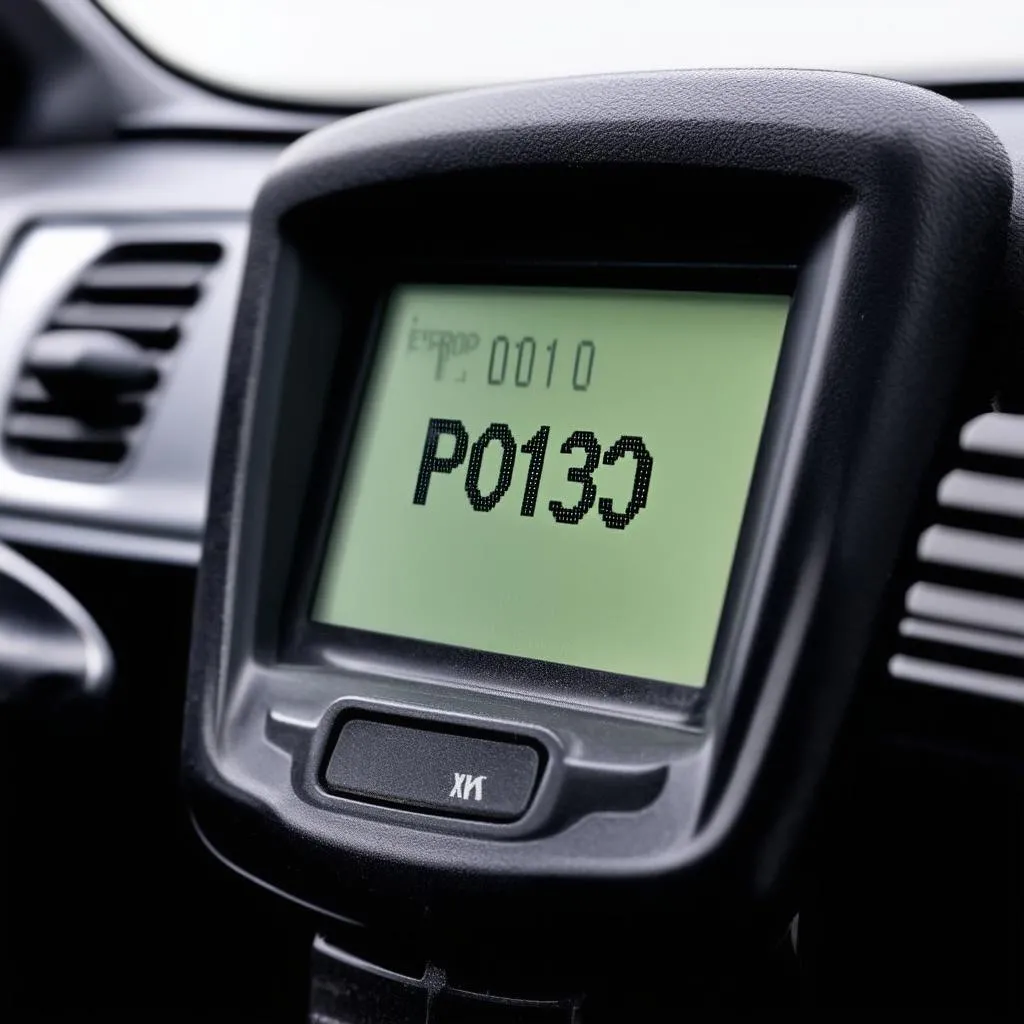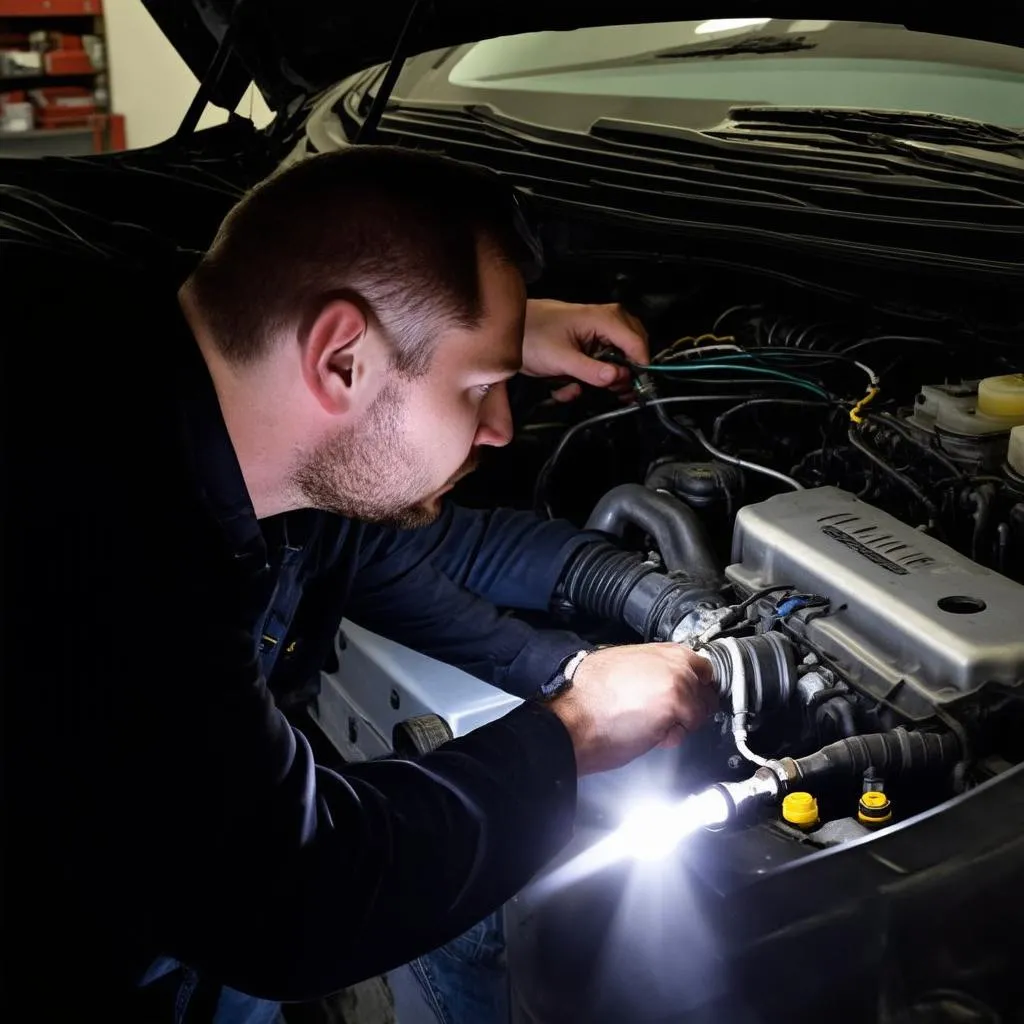Ever been cruising down the road, enjoying a beautiful sunset, when suddenly – BAM! – your check engine light throws shade on your parade? We’ve all been there. And if you’ve pulled out your trusty Actron OBD II scanner and found the code P0130 staring back at you, you might be feeling a mix of frustration and confusion.
Don’t worry, you’re in the right place. This article will walk you through everything you need to know about the P0130 code, how to use your Actron OBD II scanner to diagnose it, and what steps to take next.
What Does an Actron OBD II Scanner P0130 Code Mean?
Before we dive in, let’s set the stage. Imagine your car’s engine as a finely tuned orchestra. Each part plays a critical role in creating a harmonious symphony of power and performance. Now, your oxygen sensors are like the conductors of this orchestra, constantly monitoring the exhaust gases and sending crucial information to the engine control unit (ECU).
When your Actron OBD II scanner throws a P0130 code, it means the ECU is unhappy with the performance of Bank 1 Sensor 1 oxygen sensor – the maestro responsible for monitoring the air/fuel mixture before the catalytic converter. In simpler terms, this sensor is telling your car’s computer that something isn’t quite right with the air/fuel ratio, and it needs attention.
 OBD Scanner Reading P0130
OBD Scanner Reading P0130
Decoding the Actron OBD II Scanner P0130 Code: Causes and Solutions
A P0130 code doesn’t necessarily mean you’re facing a catastrophic engine failure. Often, it’s a sign of a relatively minor issue that can be easily resolved. Here are a few common culprits:
1. Faulty Oxygen Sensor:
Just like a conductor can lose their touch, oxygen sensors can wear out over time. They endure extreme temperatures and harsh conditions, eventually affecting their ability to send accurate signals.
Solution: Replacing the faulty oxygen sensor is often the most effective solution.
2. Exhaust Leaks:
Remember that symphony we talked about? Exhaust leaks are like unwanted noise disrupting the performance. A leak before the oxygen sensor can disrupt the exhaust stream, confusing the sensor and causing it to send inaccurate readings.
Solution: Have your exhaust system inspected and repaired by a qualified mechanic.
3. Vacuum Leaks:
Vacuum leaks can wreak havoc on your engine’s performance, including messing with the air/fuel mixture. They can occur in various places, such as intake manifold gaskets, vacuum hoses, or the PCV valve.
Solution: Identifying and repairing vacuum leaks often involves a thorough inspection using a smoke machine or a propane torch.
4. Wiring Issues:
Sometimes, the problem isn’t the sensor itself but the communication line. Damaged, corroded, or loose wiring between the oxygen sensor and the ECU can disrupt the signal, triggering the P0130 code.
Solution: Inspecting and repairing or replacing any damaged wiring harnesses or connectors.
 Mechanic Inspecting Car Engine
Mechanic Inspecting Car Engine
Navigating the P0130 Code: Expert Advice
“Ignoring a P0130 code is like ignoring a flat tire – it’s only going to get worse,” warns renowned automotive expert, Dr. Emily Carter, author of “The Complete Guide to Car Diagnostics.” She emphasizes, “Addressing the issue promptly can save you time, money, and potential headaches down the road.”
Beyond the Code: Exploring Related Questions
Here are some frequently asked questions about the Actron OBD II Scanner P0130 code:
- Can I still drive my car with a P0130 code? While you might be able to drive for a short period, it’s not recommended. Ignoring the code can lead to reduced fuel economy, increased emissions, and potential damage to your catalytic converter.
- How much does it cost to fix a P0130 code? The cost depends on the underlying cause. A simple oxygen sensor replacement might be relatively inexpensive, while repairing an exhaust leak or vacuum leak can be more costly.
- Can I fix a P0130 code myself? If you’re mechanically inclined, you might be able to replace the oxygen sensor yourself. However, diagnosing and repairing other issues like vacuum leaks or wiring problems is best left to qualified mechanics.
Actron OBD II Scanner P0130: Taking Control of Your Car’s Health
Remember, an Actron OBD II Scanner P0130 code is a warning sign, not a reason to panic. By understanding the code, its potential causes, and seeking timely assistance from a qualified mechanic, you can ensure your car’s engine remains in harmony, providing you with miles of smooth and enjoyable driving experiences.
Need Help with Your Car Diagnostics?
We’re here to help! Contact us on Whatsapp: +84767531508 for expert assistance with your diagnostic tool setup and car repair needs. Our team of automotive specialists is available 24/7 to provide you with the guidance and support you need.
Don’t forget to check out these other informative articles on techcarusa.com:
- [Common OBD II Codes and Their Meanings]
- [Choosing the Right OBD II Scanner for Your Needs]
- [DIY Car Maintenance Tips]
Let us know in the comments below if you have any questions or if you’ve experienced a P0130 code yourself!
